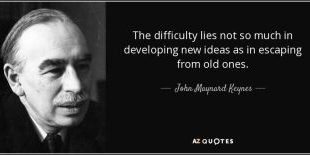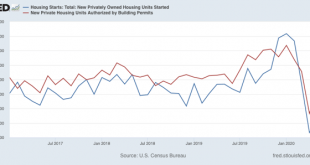Read More »
Is McConnell trying to destroy the economy for Biden?
Paul Waldman asks the question I’ve been worrying about for a few weeks: Do Republicans even want to help the American economy through this crisis? . . . But McConnell knows what’s happening. He has surely looked around and realized that with the pandemic surging, there is simply no way the economy is going to come roaring back before November. He’s seen the polls showing Trump trailing presumptive Democratic nominee Joe Biden by 10 points or more. He...
Read More »Heterodox economics needs to develop an agreed ontology and agreed modeling methods
from Ikonoclast The essential problem is that heterodox economics needs to develop an agreed ontology and agreed modeling methods, including broad agreements on the likely limits to modeling. Peter Radford has pointed out some of the ways (and reasons why) the economy cannot be modeled accurately in key respects. Orthodox economics has an agreed framework. Orthodox economists mostly agree on their framework and they accept their implied economic ontology, without question or discussion...
Read More »Monday Message Board
Back again with another Monday Message Board. Post comments on any topic. Civil discussion and no coarse language please. Side discussions and idees fixes to the sandpits, please. If you would like to receive my (hopefully) regular email news, please sign up using the following link http://eepurl.com/dAv6sX You can also follow me on Twitter @JohnQuiggin, at my Facebook public page and at my Economics in Two Lessons page Like this:Like Loading...
Read More »Keynesian vs Newtonian economics
from Lars Syll To complete his theory, Keynes tied these elements together. The market for money determined interest. Interest (and the state of business confidence) determined investment. Investment, alongside consumption, determined effective demand for output. Demand for output determined output and employment. Consumption out of incomes determined savings. Employment determined the real wage. In this world, a change in monetary policy, such as a cut in interest rates leading to an...
Read More »Improvement slows in initial claims; expect recent job growth to slow as well
Improvement slows in initial claims; expect recent job growth to slow as well A preliminary note: this morning’s report on housing permits and starts showed improvement across the board in June, although the absolute levels are no better than the low points of 2017 and late 2018-early 2019: I’ll have more at Seeking Alpha later. Now let’s turn to yesterday’s report on initial and continuing claims, which have been giving the most up-to-date snapshot...
Read More »Weekly Indicators for July 14 – 18 at Seeking Alpha
by New Deal democrat Weekly Indicators for July 14 – 18 at Seeking Alpha My Weekly Indicators post is up at Seeking Alpha. With the coronavirus beginning to rage out of control again in a majority of US States, improvement in the coincident and short leading indicators has generally halted. As usual, clicking over and reading will bring you up to the moment, and bring me a penny or two. ...
Read More »Not ageing well . . .
A month ago, when the public health community was warning about the dangers of premature opening and our reality show President was turning mask-wearing into a culture war issue, David Henderson and Jonathan Lipow decided to use precious space on the Wall Street Journal op ed page to publish an essay titled “The Data Are In: It’s Time for Major Reopening” (ungated at the link). They argue that “populationwide lockdowns should end” and even suggest that...
Read More »Trump’s handling of the economy
Robert Kuttner on public approval of Trump’s handing of the economy: As general support for Trump keeps sinking, there is one anomaly. According to this July 15 Wall Street Journal/NBC poll, which finds Biden leading Trump by 11 points, fully 54 percent of Americans approve of Trump’s handling of the economy. Really? That would be the corona economy, the worst since the Great Depression, thanks substantially to Trump’s catastrophic policies. How can this...
Read More »Why isn’t Modern Monetary Theory common knowledge?
from Blair Fix I’ve always been baffled why ‘modern monetary theory’ is called a theory. I don’t mean this in a disparaging way. As far as theories of money go, I think modern monetary theory (MMT for short) is the correct one. But having a correct theory of money is a bit like having a correct theory of traffic lights. Traffic lights (like money) are a social convention. We agree that red means stop and green means go. Why we’ve chosen these particular colors is an interesting question,...
Read More » Heterodox
Heterodox


